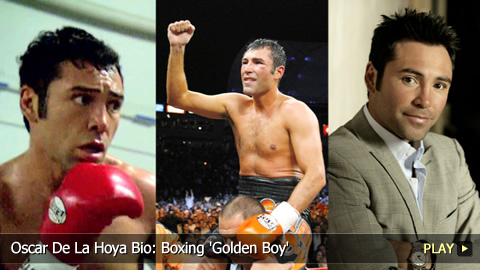Oscar De La Hoya Bio: Boxing 'Golden Boy'

Early Life
Oscar De La Hoya was born February 4th, 1973 in East Los Angeles, California to Mexican parents. Because his family had a tradition of boxing talent, he first donned the gloves at age six.
First Fights
With legendary fighter Sugar Ray Leonard as inspiration, De La Hoya trained and developed a powerful left hook. By his mid-teens, he took home several national titles, and a Golden Glove win.
Mother’s Death
However in 1990, his dream of becoming an Olympic gold medalist was threatened when his mother died of breast cancer. De La Hoya eventually continued fighting and in 1991 USA Boxing named him Boxer of the Year.
1992 Olympics
He really established himself the next year when, at 5’10”, 132 pounds, De La Hoya competed in 1992’s Barcelona Olympics. Though he struggled initially, he topped Germany’s Marco Rudolph to win the gold.
Pro Career
Following his impressive Olympic showing, De La Hoya went pro in November 1992. He won his first professional fight by knockout, and proved unbeatable. His first world title came in 1994 at age 20, when he won the World Boxing Organization super featherweight championship.
Skills and Style
De La Hoya was a finesse fighter, and his model good looks didn’t hurt the sport either. His passive-aggressive style exhausted his opponents. However, this lost him fans within his native Mexican community, due to their appreciation of a more no-holds-barred technique.
Junior Welterweight
De La Hoya moved up in weight class and continued winning: by 1995, his record was 18-0 after a series of exciting fights. The next year, as a junior welterweight at 140 pounds, De La Hoya fought and defeated legendary Mexican boxer Julio César Chávez.
Welterweight Title
1997 saw De La Hoya take the welterweight title from former Olympic gold medalist Pernell Whittaker in one of his most important victories.
First Losses
However, all good things end, and in September 18th, 1999, De La Hoya’s winning streak finished. In a record-breaking pay-per-view fight, he lost his welterweight title by decision to Felix Trinidad. Another loss soon after caused De La Hoya to take time away from his beloved sport.
Pop Album and Personal Life
During his break, De La Hoya recorded a Latin pop album, and was nominated for a Grammy award. He also focused on charity work, but his personal life suffered when his former girlfriend sued him for palimony payments of $62.5 million.
Comeback
2001 saw De La Hoya return to boxing, get married and begin his own boxing promotions company, Golden Boy.
De La Hoya vs. Vargas
By this point, De La Hoya had a fierce rivalry with “Ferocious” Fernando Vargas. The two finally met in the ring on September 14th, 2002 in what is often considered one of the most important fights of De La Hoya’s career. He won after a grueling back-and-forth, and Vargas later tested positive for steroids.
More Losses
In 2004, after controversially taking the middleweight title, De La Hoya participated in a unification match against Bernard Hopkins. De La Hoya was knocked out for the first time in his career, but he took home $30 million despite the loss.
Vs. Ricardo Mayorga
De La Hoya then took another break. Amid flurries of trash talk from Ricardo Mayorga, he made his return on May 6th, 2006 and triumphantly knocked Mayorga down within the fight’s first minute.
Floyd Mayweather, Jr.
In 2007, De La Hoya agreed to fight Floyd Mayweather Jr. This highly anticipated fight finished in a split decision in favor of Mayweather; but despite the loss, some still considered De La Hoya worthy of the win.
Passing the Torch
In 2008, De La Hoya passed the torch to the next generation of boxers by fighting star Manny Pacquiao. Although De La Hoya was the heavy favorite, he stopped the fight after eight rounds. This proved to be his last fight, and he officially retired April 14th, 2009.
Other Skills and Ventures
Aside from his boxing skills, De La Hoya was successful in business, real estate, and endorsements. He remained involved in boxing with his promotions company, and continued expanding the sport’s fanbase.
Legacy
With a 39-6 record that includes 30 KOs, titles in six different weight classes and more money earned than anyone else in the history of the sport, Oscar De La Hoya’s importance to boxing is legendary.
